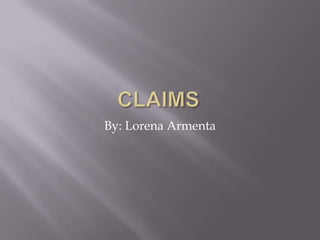Claims
•Download as PPTX, PDF•
3 likes•5,992 views
A claim is a statement of controversy that forms the central point or thesis for an argument. Effective claims are phrased as statements, are specific, and promote debate on both sides of an issue. There are three main types of claims: claims of fact which assert something exists or occurred, claims of value which make qualitative judgments, and claims of policy which assert something should or should not be done. Claims can be debated in various environments like scholarly, religious, political, business, legal, educational, and social debates.
Report
Share
Report
Share

Recommended
More Related Content
What's hot
What's hot (20)
LESSON 1- Patterns of Development in Writing Across Disciplines.pptx

LESSON 1- Patterns of Development in Writing Across Disciplines.pptx
Reading_Lesson 7 Explicit and Implicit Claims in a Text

Reading_Lesson 7 Explicit and Implicit Claims in a Text
Lesson 12 citing related literature using standard styles

Lesson 12 citing related literature using standard styles
Lesson 15 following ethical standards in writing literature

Lesson 15 following ethical standards in writing literature
Viewers also liked
Viewers also liked (14)
Similar to Claims
Similar to Claims (20)
Running head PROLIFE V. PROCHOICEWomen’s Rights and Abortio.docx

Running head PROLIFE V. PROCHOICEWomen’s Rights and Abortio.docx
Creating Cohesive Arguments Lesson for High School.pptx

Creating Cohesive Arguments Lesson for High School.pptx
Claims
- 1. Claims By: Lorena Armenta
- 2. What are Claims? A claim is any single statement of controversy advanced for the purpose of argument. A claim is the main point, the thesis, the main controlling idea.
- 3. Characteristics of Claims Are phrased as statements and not questions. Should be phrased so both sides have an opportunity to support and defend their positions. Should be as specific as possible. Must be phrased against the current belief/policy in order to create potential for controversy. Should be phrased so the burdens (obligations & responsibilities) are clear to both sides involved.
- 4. Characteristics of Claims Cont. Both sides debate the same claim. Effective claims promote a pro/con argumentative environment.
- 5. Different Types of Claims
- 6. A Claim of Fact Claim asserts that something quantifiable has existed, does exist or will exist. Examples: George W. Bush was the 43rd President. There is a God. The Steelers will beat the Packers at the SuperBowl.
- 7. A Claim of Value Claim asserts qualitative judgments along a good to bad continuum relating to person’s, events and things in one’s environment. Example: Heath Ledger was the best Joker.
- 8. A Claim of Policy Claim asserts that something should or should not be done by someone about something. Example: The United States should have stricter gun laws.
- 9. Environments claims are debated in: Scholarly debate (takes place within communities and centers on claims of fact). Religious debate (among the oldest). Political debate (advance claims for actions to be taken to deal with status quo or current belief).
- 10. Environments claims are debated in cont. Business debate (deals with claims of fact, particularly claims of future fact). Legal debate (deals with claims of fact and policy).
- 11. Environments claims are debated in cont. Educational debate (also called forensics, can be in team format or one on one format). Social debate (unstructured and deals with all three types of claims).